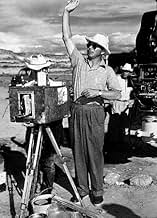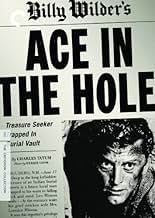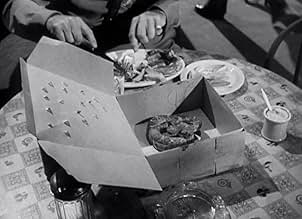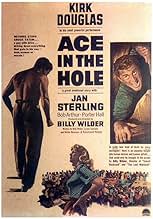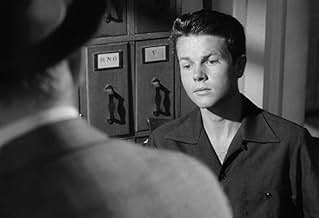IMDb RATING
8.1/10
41K
YOUR RATING
Frustrated former journalist Chuck Tatum now working for an Albuquerque newspaper exploits a story about trading post owner Leo Minosa trapped in a cave to rekindle Chuck's career, but the s... Read allFrustrated former journalist Chuck Tatum now working for an Albuquerque newspaper exploits a story about trading post owner Leo Minosa trapped in a cave to rekindle Chuck's career, but the story soon escalates into a media circus.Frustrated former journalist Chuck Tatum now working for an Albuquerque newspaper exploits a story about trading post owner Leo Minosa trapped in a cave to rekindle Chuck's career, but the story soon escalates into a media circus.
- Nominated for 1 Oscar
- 5 wins & 3 nominations total
Robert Arthur
- Herbie Cook
- (as Bob Arthur)
Roy Regnier
- Nagel - New York Editor (replaced by Richard Gaines)
- (scenes deleted)
Oscar Belinda
- Barker
- (uncredited)
Featured reviews
Saw this films years ago and it's still gripping.Mr.Wilder seldom did films that gripped the human condition like this one.After this movie flopped he stuck to screen adaptions of stage hits through most of the fifties.Both director and star,Kirk Douglas really delivered a stinging expose of media hype and manipulation of the newspaper business.Herein,burned out reporter Douglas chances on a man trapped in a cave and ruthlessly exploits it for his own gain.There's no softness here,even the leading lady (played wonderfully by Jan Sterling)is as hard as Douglas.The scenes of all the gawkers showing up,complete with carnival,are outright creepy.There's even a cheesy country western singer plunking a guitar and singing about poor Leo,(the trapped man.) The only sympathetic person is poor Leo's mom who continually prays for his release.Definitely a film for lovers of great movie drama.
A powerful toasting of the media of the day. Imagine what this would have been like in the age of television. Kirk Douglas plays a self-centered heel, and does so very well. I also liked Jan Sterling as Lorraine. It's true that there is no really sympathetic character in this film, except maybe Leo, the man trapped in the cave. Someone wrote that he too, wasn't a sympathetic character, because he was trapped while collecting Indian artifacts for sale, but I don't think that would have bothered anyone in 1951. The tone of the film throughout was one of total cynicism, that seems a bit out of place for the times. Maybe that's why this movie was not a commercial success. It fits much better now, though, since everyone has seen the media behaving in such disgraceful fashion. However, that may rob it of some of its (probably intended) shock value. Grade: A
10zinkster
One of Billy Wilder's great movies, with a superb acting job by Kirk Douglas as the cynical, glory-seeking and even desperate reporter whose only goal is get back in the limelight by regaining his former big-city news desk job.
The idea of such a newspaper reporter manipulating events to stretch out a story at the expense of and disregard for the victim still seems nearly inhuman, but Douglas' performance makes it instantly believable. The story scenario in which locals, then passers-by and finally distant tourists gravitate to and then make a festival or circus out of the event (the film was also released under the title "The Big Carnival") is supported by the real events on which the story was most likely based: the West VA mine disaster in 1925 that trapped miner Floyd Collins and was reported for 17 days, much as in the film, by local newspaperman Skeets Miller, who crawled into the mineshaft for face-to-face interviews with the trapped and doomed Collins.
This movie fits nicely into the Film Noir genre, although it takes place largely under the hot, harsh glare of the Arizona sun, highlighting the sweat and grime visible on the characters' skin and creating a visual metaphor for the sorry state of their souls. I wonder if Henri-Georges Clouzot saw this film before he began filming "The Wages of Fear," because the visually pervasive atmosphere of sweat and filth and opportunism are equally present in both.
The idea of such a newspaper reporter manipulating events to stretch out a story at the expense of and disregard for the victim still seems nearly inhuman, but Douglas' performance makes it instantly believable. The story scenario in which locals, then passers-by and finally distant tourists gravitate to and then make a festival or circus out of the event (the film was also released under the title "The Big Carnival") is supported by the real events on which the story was most likely based: the West VA mine disaster in 1925 that trapped miner Floyd Collins and was reported for 17 days, much as in the film, by local newspaperman Skeets Miller, who crawled into the mineshaft for face-to-face interviews with the trapped and doomed Collins.
This movie fits nicely into the Film Noir genre, although it takes place largely under the hot, harsh glare of the Arizona sun, highlighting the sweat and grime visible on the characters' skin and creating a visual metaphor for the sorry state of their souls. I wonder if Henri-Georges Clouzot saw this film before he began filming "The Wages of Fear," because the visually pervasive atmosphere of sweat and filth and opportunism are equally present in both.
This is a movie I have loved since the first time I saw it as a child. Kirk Douglas plays the lead role in "The Big Carnival", or "Ace in the Hole" as it was originally titled. As down and out former ace newspaper reporter Chuck Tatum, he finds himself broke in the southwest and manages to talk himself into a reporting job with a small town newspaper. He and a cub photographer are sent to cover a snake hunt and on the way they come across a more interesting story. A man hunting Navaho artifacts got caught in a cave in.
Tatum, after visiting the man, Leo Minoso in the cave, has visions of Floyd Collins and a Pulitzer prize dancing in his head. Through blackmail and manipulation of the story, Tatum sells his soul and his journalistic ethics in his quest for a chance at the big time again.
This movie was ahead of it's time in estimating how low the media would go to sell a story. Tatum leads the carnival of onlookers, vendors and other reporters wanting a piece of the story until the inevitable tragic ending occurs. He realizes too late how he has turned a simple event into a tragedy and become part of the story instead of a reporter. Kirk Douglas turns in a powerful performance.
Tatum, after visiting the man, Leo Minoso in the cave, has visions of Floyd Collins and a Pulitzer prize dancing in his head. Through blackmail and manipulation of the story, Tatum sells his soul and his journalistic ethics in his quest for a chance at the big time again.
This movie was ahead of it's time in estimating how low the media would go to sell a story. Tatum leads the carnival of onlookers, vendors and other reporters wanting a piece of the story until the inevitable tragic ending occurs. He realizes too late how he has turned a simple event into a tragedy and become part of the story instead of a reporter. Kirk Douglas turns in a powerful performance.
"Ace In the Hole," which used to turn up on local TV as "The Big carnival," was far head of its time. It wasn't very successful and its cynicism shocked people.
Along comes Andy Warhol almost two decades later with his notion of "fifteen minutes of fame" and everyone buys that concept. It's not quite the same as the concept of this. Nor is that of the very popular "Network," which came even later. But the premise here is that reporter Kirk Douglas will literally jeopardize a man's life in order to get a series of big newspaper stories. And does anyone today doubt that such things happen? Wilder was often cynical, though here it is to the most meaningful end. "the Fortune Cookie" and "Kiss Me, Stupid" are cynical also and they are both fun but this one makes a very trenchant point and they do not.
The acting is superb. Kirk Douglas gave many brilliant performances. This is one of them. The trailer included in the DVD I just saw crows that with this Jan Sterling will be immediately elevated to the top rank of female stars. That never happened but she is excellent here, as generally elsewhere.
The interviews of Wilder by Cameron Crowe tell a funny story about the genesis of one of her lines. I'd better not quote it; so get that book. It's very entertaining, informative, and touching.
Wilder was one of =this country's great directors. This will probably never be one of his most popular movies but I'd certainly rank it as one of his best.
Along comes Andy Warhol almost two decades later with his notion of "fifteen minutes of fame" and everyone buys that concept. It's not quite the same as the concept of this. Nor is that of the very popular "Network," which came even later. But the premise here is that reporter Kirk Douglas will literally jeopardize a man's life in order to get a series of big newspaper stories. And does anyone today doubt that such things happen? Wilder was often cynical, though here it is to the most meaningful end. "the Fortune Cookie" and "Kiss Me, Stupid" are cynical also and they are both fun but this one makes a very trenchant point and they do not.
The acting is superb. Kirk Douglas gave many brilliant performances. This is one of them. The trailer included in the DVD I just saw crows that with this Jan Sterling will be immediately elevated to the top rank of female stars. That never happened but she is excellent here, as generally elsewhere.
The interviews of Wilder by Cameron Crowe tell a funny story about the genesis of one of her lines. I'd better not quote it; so get that book. It's very entertaining, informative, and touching.
Wilder was one of =this country's great directors. This will probably never be one of his most popular movies but I'd certainly rank it as one of his best.
Did you know
- TriviaAfter the film was released, it got bad reviews and lost money. The studio, without Billy Wilder's permission, changed the title to "The Big Carnival" to increase the box office take of the film. It didn't work. On top of that, Wilder's next picture, Stalag 17 (1953), was a hit and he expected a share of the picture's profits. Paramount's accountants told him that since this picture lost money, the money it lost would be subtracted from the profits of "Stalag 17".
- GoofsWhen Lorraine and Chuck are talking out in front of Minosa's store by the gas pumps, reflections of the crew moving around behind the camera can be seen in the store windows.
- Quotes
Charles Tatum: Bad news sells best. Cause good news is no news.
- ConnectionsFeatured in AFI Life Achievement Award: A Tribute to Billy Wilder (1986)
- SoundtracksThe Hut-Sut Song
(uncredited)
Written by Leo Killion, Ted McMichael and Jack Owens
Sung by Richard Benedict and Kirk Douglas
Details
- Release date
- Country of origin
- Languages
- Also known as
- Ace in the Hole
- Filming locations
- Laguna Pueblo, New Mexico, USA(church exteriors)
- Production company
- See more company credits at IMDbPro
Box office
- Budget
- $1,800,000 (estimated)
- Gross worldwide
- $2,300,087
- Runtime1 hour 51 minutes
- Color
- Aspect ratio
- 1.37 : 1
Contribute to this page
Suggest an edit or add missing content



